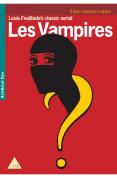 Les Vampires | DVD | (24/03/2008)
from £N/A
| Saving you £N/A (N/A%)
| RRP
Les Vampires | DVD | (24/03/2008)
from £N/A
| Saving you £N/A (N/A%)
| RRP A legendary early masterpiece of French cinema 'Les Vampires' follows the exploits of a nefarious band of master criminals led by the seductive femme fatale Irma Vep alluringly played by Musidora. Holding Paris in the grip of terror the underworld gang are pursued across the city by heroic journalist Philippe Guerande and his sidekick Mazamette. Reflecting the mood of fear and anxiety in World War I era France this meticulously restored ten-part silent serial from film pioneer Louis Feuillade - creator of the acclaimed Fant''mas serials - is a hugely influential and engrossing crime drama from cinema's golden age. Musical accompaniment composed by Eric Le Guen and Chateau Flight.
![Les Vacances de M. Hulot [Blu-ray + DVD] [1953]](/pictures/1103722.jpg) Les Vacances de M. Hulot | Blu Ray | (29/11/2010)
from £N/A
| Saving you £N/A (N/A%)
| RRP
Les Vacances de M. Hulot | Blu Ray | (29/11/2010)
from £N/A
| Saving you £N/A (N/A%)
| RRP The film that brought Jacques Tati international acclaim also launched his on-screen alter ego: the courteous well-meaning eternally accident prone Monsieur Hulot with whom Tati would from now on be inseparably associated. As with Jour de f''te the film is set in a sleepy French coastal resort which is seasonally disrupted by holidaymakers in energetic pursuit of fun. At the centre of the chaos is the eccentric Hulot struggling at all times to maintain appearances but somehow entirely divorced from his immediate surroundings. There is little plot in Tati's beautifully orchestrated 'ballet' of comic action: it's a series of incidents a seamless succession of gently mocking studies of human absurdity.
![Laissez Passer [2002]](/pictures/1002711.jpg) Laissez Passer | DVD | (24/03/2003)
from £26.98
| Saving you £-6.99 (N/A%)
| RRP
Laissez Passer | DVD | (24/03/2003)
from £26.98
| Saving you £-6.99 (N/A%)
| RRP Bertrand Tavernier directs this epic film set in 1942 Paris during the country's occupation by Germany. The French film industry during that period is the focus of the story told from the point of view of two characters: an actor and a director.
![Merci pour le Chocolat [2001]](/pictures/1006187.jpg) Merci pour le Chocolat | DVD | (19/11/2001)
from £14.98
| Saving you £5.01 (33.44%)
| RRP
Merci pour le Chocolat | DVD | (19/11/2001)
from £14.98
| Saving you £5.01 (33.44%)
| RRP Claude Chabrol's nervy and nasty little 2001 thriller Merci Pour le Chocolat is based on Charlotte Armstrong's novel The Chocolate Cobweb. In Chabrol's hands it becomes a vehicle of considerable power for the unsettling, disturbed qualities of actress Isabelle Huppert, who has been one of his most important muses over the years (their other collaborations include La Cérémonie and Rien ne va Plus). Huppert plays Mika, the owner of a Swiss chocolate factory, now married to a world-class concert pianist (Jacques Dutronc) and with a stepson who is obsessive about making the family's drinking chocolate every day. As the clues unravel, it soon becomes clear that Mika is damaged goods. When Dutronc acquires a piano student (Anna Mougalis) in curious circumstances, Mika is forced to escalate her secret agenda. Huppert is fascinating throughout and the film is sinewy and, for the most part, rather clever, evoking shades of Hitchcock and Clouzot. Liszt's Les Funérailles is the ominous leitmotif, worked on by Dutronc and his protégé, and the Lausanne setting creates an other-worldliness which seems almost sterile. Only at the end does the picture dwindle into an almost Strindbergian inertia as Mika's motivation seems to evaporate in a rather unsatisfactory way. Until then it is spellbinding. --Piers Ford
![Under The Sand [2001]](/pictures/1006211.jpg) Under The Sand | DVD | (24/09/2001)
from £22.78
| Saving you £-2.79 (N/A%)
| RRP
Under The Sand | DVD | (24/09/2001)
from £22.78
| Saving you £-2.79 (N/A%)
| RRP Marie, a professor of English literature in a Paris university, has been happily married to Jean for 25 years. During their summer holiday he vanishes. Has he left her? commited suicide? drowned? With no clue she acts as if he is still alive.
![LA POISON [POISON] (Masters of Cinema) (DVD)](/pictures/1119115.jpg) LA POISON | DVD | (25/02/2013)
from £19.99
| Saving you £-2.00 (N/A%)
| RRP
LA POISON | DVD | (25/02/2013)
from £19.99
| Saving you £-2.00 (N/A%)
| RRP One of the great late period films by Sacha Guitry - the total auteur who delighted (and scandalised) the French public and inspired the French New Wave as a model for authorship as director-writer-star of screen and stage alike. In every one of his pictures (and almost every one served as a rueful examination of the war between the sexes), Guitry sculpted by way of a rapier wit - one might say by way of the Guitry touch - some of the most sophisticated black comedies ever conceived... and La Poison [Poison] is one of his blackest. Michel Simon plays Paul Braconnier, a man with designs on murdering his wife Blandine (Germaine Reuver) - a woman with similar designs on her husband. When Braconnier visits Paris to consult with a lawyer about the perfect way of killing a spouse - that is, the way in which he can get away with it - an acid comedy unfolds that reaches its peak in a courtroom scene for the ages. From the moment of Guitry's trademark introduction of his principals in the opening credits, and on through the brilliant performance by national treasure Michel Simon (of Renoir's Boudu sauve des eaux and Vigo's L'Atalante, to mention only two high-water marks), here is fitting indication of why Guitry is considered by many the Gallic equal of Ernst Lubitsch. The Masters of Cinema Series is proud to introduce Sacha Guitry into the catalogue with La Poison for the first time on video in the UK in a dazzling new Gaumont restoration. Special Features: Newly translated optional subtitles Substantial booklet containing writing on the film, vintage excerpts, and rare archival imagery
![The Hairdresser's Husband [1991]](/pictures/1006357.jpg) The Hairdresser's Husband | DVD | (25/09/2000)
from £19.16
| Saving you £0.83 (4.33%)
| RRP
The Hairdresser's Husband | DVD | (25/09/2000)
from £19.16
| Saving you £0.83 (4.33%)
| RRP At the age of 12 Antoine's life is dominated by twin passions dancing to Arabic music and getting his hair cut by the voluptuous middle-aged local hairdresser who inadvertently provides him with his first experience of the opposite sex. Antoine reaches middle age with his passion undiminished: upon meeting shy hairdresser Mathilde he is so taken by her that he proposes marriage. She accepts and he moves into her salon where they pursue their romance with an intensity that blinds them to the mundane realities of the outside world.
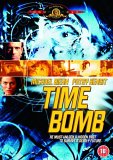 Timebomb | DVD | (11/04/2005)
from £32.32
| Saving you £-19.33 (N/A%)
| RRP
Timebomb | DVD | (11/04/2005)
from £32.32
| Saving you £-19.33 (N/A%)
| RRP Eddy Kay is wired to explode! Director Avi Nesher (Turn Left At The End Of The World The Taxman) demonstrates his flair for suspense and adrenaline-pumping spectacle in this gripping story of one man's quest for the truth. When watchmaker Eddie Kaye played by action veteran Michael Biehn survives a mysterious attempt on his life he begins to suffer flashbacks to a violent past he can't remember. Fearing for his sanity he turns to psychiatrist Dr Anna Nolmar (Patsy Ken
![Carry on [30 Disc Box Set]](/pictures/1052015.jpg) Carry on | DVD | (20/11/2006)
from £N/A
| Saving you £N/A (N/A%)
| RRP
Carry on | DVD | (20/11/2006)
from £N/A
| Saving you £N/A (N/A%)
| RRP This box set features a veritable campsite of bawdy comedic treats from the Carry On crew! Includes: 1. Carry On Abroad (1972) 2. Carry On Again Doctor (1972) 3. Carry On Doctor (1967) 4. Carry On Don't Lose Your Head (1966) 5. Carry On England (1976) 6. Carry On Follow That Camel (1967) 7. Carry On Matron (1972) 8. Carry On at Your Convenience (1971) 9. Carry On Behind (1975) 10. Carry On Camping (1969) 11. Carry On Dick (1974) 12. Carry On Emmanuelle (1978) 13. Carry On Girls (1973) 14. Carry On Henry (1971) 15. Carry On Holiday 16. Carry On Loving (1970) 17. Carry On Up The Jungle (1970) 18. Carry On up the Khyber (1968) 19. Carry On Sergeant (1958) 20. Carry On Nurse (1959) 21. Carry On Teacher (1959) 22. Carry On Constable (1960) 23. Carry On Regardless (1961) 24. Carry On Cruising (1962) 25. Carry On Cabby (1963) 26. Carry On Jack (1963) 27. Carry On Spying (1964) 28. Carry On Cleo (1964) 29. Carry On Cowboy (1965) 30. Carry On Screaming! (1966)
![Wuthering Heights [1985]](/pictures/1075083.jpg) Wuthering Heights | DVD | (25/02/2008)
from £7.99
| Saving you £7.00 (87.61%)
| RRP
Wuthering Heights | DVD | (25/02/2008)
from £7.99
| Saving you £7.00 (87.61%)
| RRP Based on Emily Bronte's classic 19th-century novel Wuthering Heights this beautiful sensual film tells the story of the tormented love affair between two childhood sweethearts Catherine a headstrong young woman and Roc a fiery young gypsy. The groundbreaking French director Jacques Rivette sets one of literature's greatest love stories in the French countryside of the 1930s.
![Eagles Over London [DVD] [1969]](/pictures/1098480.jpg) Eagles Over London | DVD | (07/06/2010)
from £N/A
| Saving you £N/A (N/A%)
| RRP
Eagles Over London | DVD | (07/06/2010)
from £N/A
| Saving you £N/A (N/A%)
| RRP Nine years before his WWII cult classic Inglorious Bastards, Enzo Castellari virtually invented the 'Macaroni Combat' genre with this over-the-top saga of valour, vengeance and machine-gun mayhem. Hollywood legend Van Johnson The Caine Mutiny and Frederick Stafford (Hitchcock's Topaz) star as military officers pursuing a merciless team of Nazi saboteurs through war-ravaged London, featuring Castellari's jaw-dropping recreations of The Siege Of Dunkirk, The Battle Of Bri...
![Farinelli - Il Castrato [1995]](/pictures/1018208.jpg) Farinelli - Il Castrato | DVD | (26/04/2004)
from £N/A
| Saving you £N/A (N/A%)
| RRP
Farinelli - Il Castrato | DVD | (26/04/2004)
from £N/A
| Saving you £N/A (N/A%)
| RRP  Jour de fête (DVD and Blu-ray) | Blu Ray | (29/10/2012)
from £13.48
| Saving you £6.51 (48.29%)
| RRP
Jour de fête (DVD and Blu-ray) | Blu Ray | (29/10/2012)
from £13.48
| Saving you £6.51 (48.29%)
| RRP The BFI's celebrated Jacques Tati remaster series continues with the world premiere High Definition release of the great director's much-loved debut, Jour de f�te, in not one, but two different versions. This award-winning comic masterpiece introduced audiences to Tati's dazzling blend of satire and slapstick, and has won the hearts of audiences the world over. Tati plays an appealingly inept postman who is intent on modernising the postal system in the depths of rural France. Tati's...
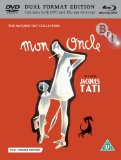 Mon Oncle (DVD and Blu-ray) | Blu Ray | (29/10/2012)
from £N/A
| Saving you £N/A (N/A%)
| RRP
Mon Oncle (DVD and Blu-ray) | Blu Ray | (29/10/2012)
from £N/A
| Saving you £N/A (N/A%)
| RRP The BFI’s acclaimed Jacques Tati remaster series continues with the world premiere High Definition release of Tati’s multi-award-winning third feature, Mon Oncle, in two different versions. This 1958 box-office hit confirmed his reputation as the foremost comic artist of his day and picked up a string of awards, including the 1959 Oscar for Best Foreign Film.Tati’s second outing as the accident-prone Monsieur Hulot takes him to Paris where the high-tech lifestyle of his relatives, the Arpels, is contrasted with his old-fashioned ways in a scruffy part of town. With an eye on the international market, and wishing to avoid subtitles (which he always disliked), Tati shot two versions of the film – Mon Oncle and My Uncle, the latter replacing French signs such as ‘Ecole’ and ‘Sortie’ with their English equivalents and dubbing much of the main dialogue into English. This specially remastered edition contains both versions.
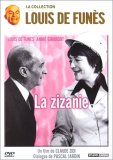 La Zizanie | DVD | (16/08/2005)
from £11.39
| Saving you £-0.17 (N/A%)
| RRP
La Zizanie | DVD | (16/08/2005)
from £11.39
| Saving you £-0.17 (N/A%)
| RRP An inventor and a small-time industrialist Guillaume (Louis De Funes) has come up with something which will take advantage of air pollution and manages to confuse a delegation of Japanese into placing an order for 3 000 of the things. Just a few obstacles stand in the way of his delivering on the order. For one thing he has no factory in which to make them. He decides to dedicate all the extra space in his house to building them though perhaps he should have told his wife (Annie Girardot) first because she seems to have been made unhappy by these developments.
![Offenbach: La Vie Parisienne [1991]](/pictures/1028566.jpg) Offenbach: La Vie Parisienne | DVD | (14/02/2002)
from £25.21
| Saving you £4.78 (18.96%)
| RRP
Offenbach: La Vie Parisienne | DVD | (14/02/2002)
from £25.21
| Saving you £4.78 (18.96%)
| RRP Offenbach's 1867 La Vie Parisienne is perhaps the quintessential French comic operetta: a broad satire on Paris society set against the backdrop of the 1867 Exposition and the descent of easily lampooned foreigners on to the city; sharp moments that Molière would be proud of; undercurrents of quick-fire farce, confusion, lust and mistaken identity; and a rich cast of characters racing inexorably to a can-can finale. This 1991 production by the Lyon National Opera presents a welcome opportunity to revel in a uniquely Gallic confection rarely seen outside France. It's also a chance to enjoy one of Offenbach's most inventive, melodic scores in which the starring musical role and many of the best tunes go to the orchestra, here conducted by Jean-Yves Ossonce. This is no accident: the operetta was originally created for a company of actors who relied on pastiche and the composer's help to get them through their "numbers". Not so these singers, of course. As Metella, the languorous courtesan who is responsible for the unravelling debacle, Helene Delavault is in meltingly good voice for her show-stopping rondeau, "A minuit sonnant commence la fete". Her sparring suitors Gardefeu (Jean-Francois Sivadier) and, particularly, Bobinet (Jacques Verzier) combine marvellous visual comedy with fluid singing and there is some dazzling vocal work from the supporting cast. It's a long piece, but hugely enjoyable. On the DVD: La Vie Parisienne has the usual, excellent booklet notes of ArtHaus DVD releases, which go some way to compensate for a disappointing lack of extras. Time, surely, to introduce some on-screen history or cross-references to other relevant works. The picture quality is good and sharp, although the 4:3 format does little justice to Carlo Tommasi's sweeping, stylish sets. The PCM Stereo soundtrack provides an adequate orchestral experience while managing to muffle much of the spoken dialogue. --Piers Ford
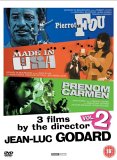 Jean-Luc Godard DVD Collection - Vol. 2 | DVD | (04/04/2005)
from £N/A
| Saving you £N/A (N/A%)
| RRP
Jean-Luc Godard DVD Collection - Vol. 2 | DVD | (04/04/2005)
from £N/A
| Saving you £N/A (N/A%)
| RRP Includes the classic Nouvelle Vague (New Wave) Godard films 'Pierrot Le Fou' Made In USA and Prenom Carmen. Pierrot Le Fou: Described as the film where Godard tried everything and almost pulled it off 'Pierrot Le Fou' is his deconstruction of the American crime thriller. Ferdinand escapes Bourgeious society with the babysitter Marianne in tow... When a dead body is found in Marianne's apartment the two lovers head for the South of France to escape being caught up in gangster activities. On an island on the C''te d'Azur Ferdinand is content to read and write poetry but Marianne's impatience gets the better of her and she disappears to join her brother a notorious gun runner. Another dead body is found then armed gangsters arrive on the scene to menace Ferdinand.... Made In USA: A journalist Paula Nelson arrives in Atlantic City France to look for her missing ex-boyfriend Richard Politzer. Her enquiries soon reveal that he is dead murdered by an unknown assassin. Suspecting that Richard may have been the victim of a political intrigue Paula allies herself with gun-toting gangsters and shady police agents to try to uncover the truth.... Prenom Carmen: During a failed bank raid a terrorist named Carmen is seduced by a security guard Joseph. To escape arrest Carmen appears to submit to her obsessed lover and the two take refuge in a seaside apartment. However Carmen remains committed to her terrorist activities and plans a kidnapping whilst pretending to film a documentary for her uncle once a great film director. How will Joseph react to Carmen's apparent indifference to their relationship?
![Swinging Bach [2000]](/pictures/1028568.jpg) Swinging Bach | DVD | (20/08/2001)
from £N/A
| Saving you £N/A (N/A%)
| RRP
Swinging Bach | DVD | (20/08/2001)
from £N/A
| Saving you £N/A (N/A%)
| RRP A swinging performance of Johann Sebastian Bach's music recorded at the Marktplatz Leipzig July 28th 2000.
![Carnages [2002]](/pictures/1017184.jpg) Carnages | DVD | (21/03/2005)
from £5.62
| Saving you £15.63 (358.49%)
| RRP
Carnages | DVD | (21/03/2005)
from £5.62
| Saving you £15.63 (358.49%)
| RRP After a bull dies in an arena, its remains are transported throughout Belgium, France, and Spain, where various characters cross its path.
 I Pierre Riviere | DVD | (24/03/2008)
from £17.35
| Saving you £2.64 (15.22%)
| RRP
I Pierre Riviere | DVD | (24/03/2008)
from £17.35
| Saving you £2.64 (15.22%)
| RRP Based on documents compiled by leading French philosopher Michel Foucault I Pierre Riviere a unique and original film charts the gruesome events which took place in a Normandy village in 1835 when a young man Pierre Riviere murdered his mother sister and brother before fleeing to the countryside. With a cast made up of real-life villagers from the area where the events took place the detailed re-enactments and careful attention to the gestures of their ancestors serve to create an intense and sometimes disturbing atmosphere of hyper-realism. Details of the crime and of the trial that followed are told from varied perspectives including the written confession of Pierre himself and form a rich and complex narrative that interrogates the concepts of 'truth' and 'history'. Radical bold and uncompromising director Rene Allio's extraordinary work is at one and the same time an ethnographic enquiry an historical reconstruction and an unflinching portrait of psychopathology and its aftermath.

Please wait. Loading...
This site uses cookies.
More details in our privacy policy